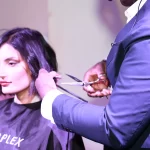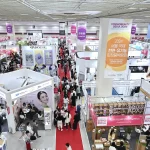Haysam Eid is not just a name in the Middle Eastern beauty industry—he is a force shaping its evolution. From his early days as a hairdresser in Lebanon to building one of the region’s most influential beauty distribution networks and now as the licensee of Estetica Middle East, his journey is as dynamic as the industry he serves. But beyond business, he is also a dedicated sportsman, embodying discipline and resilience in all aspects of life. In this exclusive interview, Haysam shares his insights on the Middle Eastern beauty market, the future of the industry, and the philosophy that drives his success.
Your career has taken several fascinating turns, from hairdressing to distribution. Can you take us through the journey that led you here?
I started as a hairdresser, following in my father’s footsteps in Lebanon. My formal training began in London. After a short stint working in the UK, I returned to Beirut to work in my father’s salon, which was recognised as one of the world’s top three salons by Estetica in 2005.
While I enjoyed hairdressing, I realised I wanted to expand my role beyond the salon. I had a business mindset and saw a gap in the Middle Eastern professional hair care market. This led to the founding of EIDEAL in 2008, focusing on high-quality tools and education for professionals before expanding into distribution. We introduced brands like Davines, Olaplex and Comfort Zone to the region.

You are known for your adventurous side. How has sports influenced your career?
Sports have played an important role in shaping my mindset. I’ve done an ultra-marathon in the desert—250 kilometres over five days—which taught me resilience, endurance, and strategic thinking. Today, I do CrossFit and show jumping, and I see a lot of parallels between sports and business. You must stay disciplined, push your limits, and constantly adapt to challenges.
The same principles apply, whether it’s launching a new product or growing a brand.
The Middle Eastern beauty industry is evolving rapidly. What key trends are shaping the market?
There’s a significant shift toward personalisation, sustainability, and tech-integrated beauty solutions. We’re seeing increased demand for clean beauty products, tech-integrated solutions, and treatments tailored to regional preferences. Consumers are more informed than ever and come to salons knowing precisely what they want. The male grooming sector is also booming—barbershops are becoming more sophisticated, and men are investing more in skincare and self-care.
Another major trend is the rise of B2C professional beauty. People want to recreate the salon experience at home, which presents both a challenge and an opportunity for salons. Some see it as competition, but I believe it’s a chance to build stronger client relationships. Educating customers on home care actually encourages loyalty—if they trust your expertise, they’ll always return for the full experience.
What challenges and opportunities do international beauty brands face when entering the Middle Eastern market?
Brands entering the Middle East must navigate diverse consumer preferences across different regions. Understanding local beauty standards, halal requirements, and cultural nuances is crucial. The opportunity lies in offering customized solutions while maintaining global quality standards. Success requires strong distribution networks and authentic community engagement.
That being said, the opportunities are enormous. Consumers in the region are passionate about beauty and willing to invest in high-quality products. Regional developments have accelerated digital transformation in beauty retail. Consumer behaviour has shifted toward omnichannel experiences, with greater emphasis on local manufacturing and supply chain resilience. These changes have created opportunities for innovative business models. E-commerce is also growing rapidly, making beauty more accessible than ever. If a brand is willing to localise its approach, the Middle East can be a game-changing market.
You’ve been involved in major industry fairs in Dubai. What role do they play in the region?
Industry fairs have always been a valuable platform for networking, discovering new brands, and facilitating business growth. They provide an essential space for international companies looking to enter the Middle Eastern market and connect with potential distributors.
That said, the industry is evolving, and so is the way we engage with our community. While trade fairs remain relevant, many professionals now prefer more targeted, immersive experiences, whether through private events, digital platforms, or educational initiatives. At EIDEAL, we’ve been exploring new ways to engage with our network, ensuring we stay connected meaningfully and effectively.

Looking back on your journey, what moment or achievement are you most proud of?
Building EIDEAL from a distribution business into a recognized brand that empowers beauty professionals is my proudest achievement. Seeing our tools in top salons and knowing we’ve contributed to raising industry standards is incredibly fulfilling.
How do you see the role of influencers in the Middle Eastern beauty scene?
Influencers have a huge impact, particularly in the UAE, which has become a global influencer hub. But we are also seeing more hairdressers becoming influencers in their own right—showcasing their skills, educating their audience, and building a personal brand.
At EIDEAL, we work with influencers selectively. It’s not just about numbers—it’s about authenticity. If we partner with someone, they must genuinely believe in the product and align with the brand’s values. Consumers today are smart—they can tell when something is just a paid promotion versus an actual endorsement.
How do you view the role of Estetica Middle East in shaping the beauty industry?
Taking on the role of Estetica Middle East’s licensee was a natural progression, allowing me to further contribute to the industry’s development. It was never about business—it was about building a platform where professionals could share their expertise, get recognition, and elevate the region’s beauty standards. Our goal is to build a community, not just publish content.
The future of Middle Eastern beauty is incredibly promising, with rising demand for personalized experiences and sustainable solutions. Estetica plays a crucial role by connecting industry stakeholders, sharing innovations, and promoting professional excellence. We’re particularly excited about emerging technologies and their potential to transform beauty services.
Looking ahead, I’d love to launch initiatives like Salon Awards for the Middle East—something that recognizes excellence in the industry. Estetica has the potential to bring professionals together.
What’s next for you? Are there any exciting projects in the pipeline?
Right now, we’re focused on a new project that blends professional and consumer-friendly products. The goal is to take it global—we believe it has international potential.
Beyond that, I’m always looking for new ways to push the industry forward through innovation, education, or community-building. The Middle East is a fast-moving market, and I want to be part of shaping its future.





